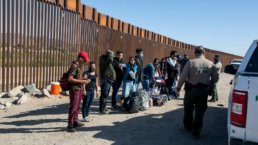We militarize our borders and keep people seeking work from doing it. Then legislators insist we need child labor to fill a “worker shortage.” What kind of country is this?
by Nathan J. Robinson, Current Affairs
Incredibly, there is a new effort afoot to allow more child labor in the U.S. The Economic Policy Institute reported earlier this month that “violations of child labor laws and proposals to roll back child labor protections are on the rise across the country,” including bills under consideration to allow young teenagers to work in meatpacking plants. The Biden administration is belatedly promising to step up enforcement, as it has become clear that employers violate child labor laws with impunity, and “children now are working hazardous jobs in every state and across industries,” “taking jobs in slaughterhouses, construction sites and commercial bakeries—positions that have long been off-limits to American children for nearly a century.”

But, as Tyler Walicek notes at Truthout, the problem is not just that the laws are being flouted, because plenty of exploitative child labor is already legal, and “enormous numbers of minors, many of them migrant children, are legally employed on U.S. farms, thanks to an underage-labor exemption unique to agriculture.” The Atlantic ran a disturbing expose several years ago on children as young as 10 or 11 who work in America’s tobacco fields. The New York Times recently reported that “in many parts of the country, middle and high school teachers in English-language learner programs say it is now common for nearly all their students to rush off to long shifts after their classes end.”
One would have assumed the debate about child labor to be long since settled. Children deserve to focus on playing, learning, and developing. They shouldn’t be sent down mines and into meatpacking plants! But astonishingly, there are still those who justify sending children to work. The libertarian Foundation for Economic Education even published an article called “Let The Kids Work,” claiming (quite seriously) that working down a mine is an “exciting life” that children will like because they enjoy “danger,” and it’s more interesting than sitting at a desk. The libertarian economist Bryan Caplan makes a similar argument in The Case Against Education, arguing that school sucks so much that for many kids, a job would be better. (I co-authored a review of the book in Current Affairs, and pointed out that this is an argument for making school better, not for sending children to work in Amazon warehouses.)
Some libertarians don’t see any philosophical problem with sending kids to work generally. (Although note that it’s not clear they would send their own children to work in meatpacking plants, and usually what we’re talking about in practice is whether poor children will be sent to work.) But today, there is an additional justification offered for relaxing the child labor laws, which is that we have something referred to as a “labor shortage” in the United States: there just aren’t enough people to work certain jobs. Axios reports that “the bills are largely in response to the current hot jobs market, with employers posting an elevated number of openings but struggling to fill positions.”
Recent Posts
‘Unconstitutional. Unethical. Authoritarian.’ ICE Bars Millions Of Immigrants From Bond Hearings
July 18, 2025
Take Action Now One watchdog said the new policy “seems like a blatant attempt to stop them from exercising their right to due process.”……
Americans Are Not Nearly Alarmed Enough About Climate Change
July 18, 2025
Take Action Now Americans still don’t comprehend how imminent, dangerous, and far-reaching the threat is—and journalists are partly to blame.By…
The IRS Is Building A Vast System To Share Millions Of Taxpayers’ Data With ICE
July 17, 2025
Take Action Now ProPublica has obtained the blueprint for the Trump administration’s unprecedented plan to turn over IRS records to Homeland Security…
Israel’s Sudden Assault On Syria Is Unchecked Aggression
July 17, 2025
Take Action Now Jerusalem is bombing Damascus and threatening al-Sharaa’s rule, while Washington was hoping to help the nascent government on…




